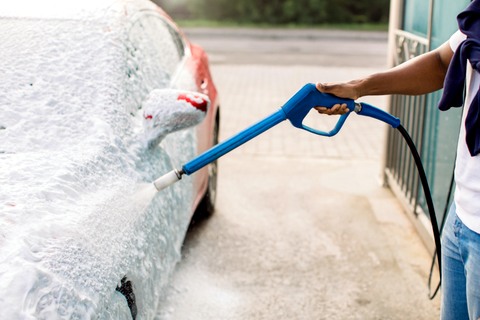How to Safely and Effectively Use a Car Pressure Washer
Tips to Keep Your Car Clean and You Safe
This article may contain affiliate links.
A car pressure washer is a powerful tool that can make car cleaning an easy and efficient task. However, using it safely and effectively is crucial to avoid damage to your vehicle or injury to yourself. This article will guide you through the essential steps and precautions to ensure safe and effective usage of a car pressure washer, allowing you to achieve a pristine clean without mishaps. Once your car is clean, you should invest in Elite ceramic coatings to further protect your paint job from unsightly chips and scratches.

Read the User Manual
Before using a car pressure washer, it’s imperative to thoroughly read the user guide provided by the manufacturer. The manual will provide important information about your pressure washer model’s specific features, operating instructions and safety guidelines. Familiarize yourself with the controls, recommended operating procedures and any warnings or precautions mentioned in the manual.
Wear Protective Gear
Protective gear is essential when using a car pressure washer to safeguard yourself from potential hazards. Wear safety goggles or a face shield to protect your eyes from debris, water splashes and cleaning chemicals. Additionally, wearing waterproof gloves will protect your hands from the high-pressure water stream and any cleaning agents you may use. Non-slip footwear is also recommended to prevent any accidents due to slippery surfaces.
Choose the Right Nozzle and Spray Pattern
The appropriate nozzle and spray pattern is crucial for effective and safe cleaning. Start with a wider spray pattern for general cleaning tasks, such as 25 or 40 degrees. This provides a good balance between pressure and coverage. Avoid using the pinpoint 0-degree nozzle on the car’s body, as it can be too concentrated and cause damage. Reserve the 0-degree nozzle for tough wheel stains or other heavy-duty cleaning purposes.
Maintain a Safe Distance
Maintaining a safe distance between the pressure washer nozzle and the car’s surface is important to prevent damage. Generally, it is recommended to keep a distance of around 12 to 18 inches from the car while spraying. This ensures that the water pressure effectively removes dirt but is not too close to cause harm. Adjust the distance depending on the pressure and intensity required for specific cleaning tasks.

Pre-rinse and Apply Detergent
Before using the pressure washer, pre-rinse your car with a gentle stream of water to loosen dirt and debris. This helps minimise the abrasive particles that may come in contact with the car’s surface during the main cleaning process. Once pre-rinsed, apply a suitable car cleaning detergent or foam using a foam cannon or a dedicated detergent nozzle. Follow the manufacturer’s instructions for the appropriate detergent-to-water ratio, and allow the detergent to dwell for a few minutes to break down stubborn grime.
Start Cleaning from Top to Bottom
When using a car pressure washer, it is best to start cleaning from the top of the vehicle and work your way down. This prevents dirty water and debris from flowing onto previously cleaned areas. Begin by directing the spray towards the car’s roof, windows, and upper sections. Gradually move downwards, cleaning the hood, trunk, doors, and finally, the lower areas, including the wheels and undercarriage.
Use Proper Techniques for Different Surfaces
Different surfaces of your car may require different cleaning techniques. When cleaning the car’s body, use broad, sweeping motions following the contours of the vehicle. Avoid concentrating the water stream on a single spot for too long, as this may cause damage to the paint or clear coat. Use a more concentrated spray pattern for wheels and tires to remove brake dust and grime effectively. Pay attention to the appropriate pressure and techniques for delicate surfaces like chrome trims or plastic mouldings to prevent scratches or damage.
Rinse Thoroughly and Dry
After cleaning, thoroughly rinse the car with clean water, starting from the top and working your way down. Ensure that all soap residue and cleaning agents are completely removed. Leaving any detergent on the surface can lead to streaks or damage over time. Once rinsed, use a soft microfiber towel or chamois to gently dry the car, absorbing any remaining water droplets and preventing water spots.
Conclusion
Using a car pressure washer can make car cleaning a breeze, but it’s important to prioritise safety and effectiveness. By adhering to the steps outlined in this guide, you can guarantee a secure and fruitful car cleaning experience. It is important to consult the user manual
